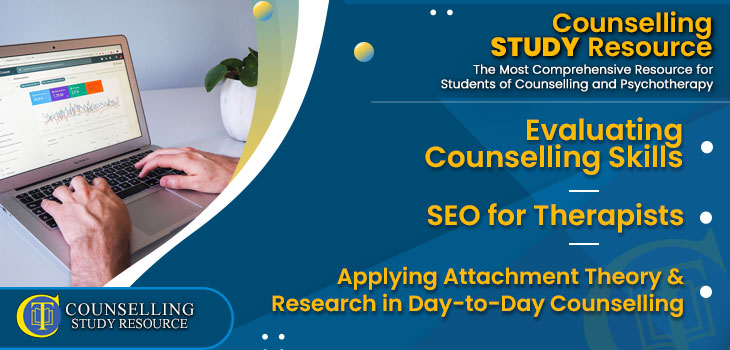248 – SEO for Therapists
Evaluating Counselling Skills – Applying Attachment Theory and Research in Day-to-Day Counselling
In Episode 248 of the Counselling Tutor Podcast, your hosts Rory Lees-Oakes and Ken Kelly take us through this week’s three topics:
- In ‘Theory in Practice’, we look at evaluating and improving your counselling skills.
- Then in ‘Practice Partner’, Rory and Ken discuss SEO for therapists and counsellors (in particular how to use local SEO effectively).
- And finally in ‘Practice Matters’, Rory speaks with Dr. Jeremy Holmes on attachment theory and research in day-to-day counselling.
Evaluating Counselling Skills [starts at 02:42 mins]
Counselling Foundations is sponsored by
Counselling Skills Academy
Learn counselling techniques by seeing counselling skills used in real sessions by qualified therapists.
Real sessions - real-life presentations - real skills.
When it comes to improving your counselling skills, practice makes perfect. Here are some ways Rory and Ken suggest you may want to go about this:
- For skills evaluation, record stimulated skills sessions and ask your peers/colleagues to listen and offer feedback.
- Don’t be frightened when it comes to practicing these skills – the more we know, the less we fear.
- This is a lifetime endeavor – even once you're qualified, you can always develop your counselling skills further.
- What does the theory tell us about the skill – what is the result of using this skill for the speaker and listener?
- In retrospect, would you choose the same skill? Or would a different skill have been more effective?
- You're looking for client movement – are they feeling heard? Understood?
A handout on the Blueprint to Passing Your Skills Evaluation is available for download in the green button above.
SEO for Therapists [starts at 20:20 mins]
As clients are an essential part of running your practice, it’s important that when someone in your area is searching for help, your website can easily be found.
The key points of this section on SEO for therapists include:
- You want whatever people might be searching for to be on your website. E.g. if a client is searching “counselling in (town/city)” you're going to want your website to state pretty early on that you are a counsellor based in said town or city.
- Google My Business – registering your website with Google will confirm your location and establish you as a legitimate business, something that will help your therapy website’s SEO. This may result in your website coming up higher in searches made in your area.
- Another way to help improve the SEO of your therapy website is to make sure that the contact details and address you use on your website are consistent everywhere.
- Your website will need a privacy policy.
- Paying attention to these details are all small things that can make your website more favourable to Google’s algorithm and therefore place your website higher on search results.
Applying Attachment Theory and Research in Day-to-Day Counselling [starts at 38:57 mins]
The National Counselling Society is proud to sponsor Practice Matters.
NCS are really excited to have launched their Children and Young People Therapist Register for counsellors working with the younger age group.
In this week’s ‘Practice Matters’, Rory speaks with Dr. Jeremy Holmes on applying attachment theory and research in day-to-day counselling.
The main points of this discussion include:
- When encountering clients, we need to be absolutely open-minded – we don’t want our theories rattling around the room as this can interfere with our receptiveness to clients and may interfere with a client’s openness.
- When we’re threatened, stressed, or ill; our capacity to think or explore is put on hold and we seek out an attachment figure.
- Counselling will activate a clients attachment dynamic – they're in a vulnerable space where they'll be expected to share their thoughts and worries.
- As a counsellor, you’ll be presenting yourself as a solid figure the client can co-regulate from.
- Use attachment theory as an essential tool to understand a client and help them grow.


